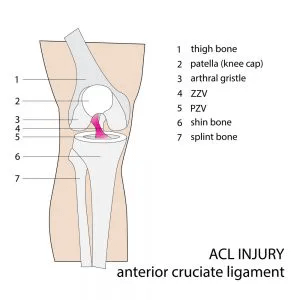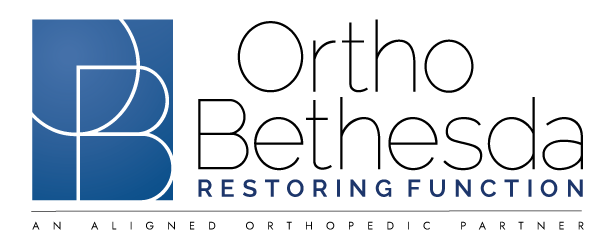Understanding ACL Tears
An ACL tear (anterior cruciate ligament tear) is one of the most common sports injuries seen by our orthopedic and sports medicine specialists at OrthoBethesda. The ACL is one of four major ligaments that stabilize your knee joint, keeping your leg aligned and allowing for smooth, coordinated movement.
When the ACL is injured, the knee can feel unstable or “give way,” especially during activities involving jumping, pivoting, or quick direction changes. These injuries are particularly common among athletes—but they can happen to anyone.
How Does an ACL Tear Occur?
ACL tears usually happen during sudden movements such as:
- Landing awkwardly from a jump
- Rapidly changing direction while running
- Stopping suddenly
- Direct impact to the knee
Patients often hear or feel a “pop” at the time of injury, followed by immediate swelling and a sense that the knee is unstable. Pain may not be severe at first but typically increases as swelling builds over several hours.

Signs & Symptoms of an ACL Tear
Common symptoms include:
- A popping sound or sensation in the knee
- Swelling within the first few hours
- Knee instability or “giving out” during activity
- Pain when twisting or pivoting
- Difficulty bearing weight
If you experience these symptoms, especially after a sports injury, it’s important to be evaluated promptly by an orthopedic specialist.
What to Do If You Suspect an ACL Tear
If you think you’ve torn your ACL:
- Stop activity immediately to avoid worsening the injury.
- Apply ice (20 minutes on, 40 minutes off) to reduce swelling.
- Keep the leg elevated above heart level when possible.
- Use crutches or a knee brace if weight-bearing is painful.
You should see an orthopedic surgeon within a few days for evaluation. Diagnostic imaging such as an X-ray or MRI will confirm the injury and help your doctor plan the best treatment.
Treatment Options for ACL Tears
Treatment depends on the severity of the tear, your activity level, and your goals.
- Nonsurgical Management – Some partial ACL tears can be treated with physical therapy, bracing, and activity modification.
- ACL Reconstruction Surgery – For complete tears or active patients, ACL reconstruction restores stability by replacing the torn ligament with a graft.
At OrthoBethesda, our fellowship-trained orthopedic surgeons specialize in arthroscopic ACL reconstruction, using minimally invasive techniques that promote faster recovery, less pain, and stronger outcomes.
Rehabilitation & Recovery
Rehabilitation is essential after an ACL injury—whether treated surgically or nonsurgically. Our on-site physical therapy team works with your surgeon to design a customized recovery plan focused on:
- Regaining motion and strength
- Reducing pain and swelling
- Restoring balance and stability
- Returning safely to sport or activity
Most patients can expect to return to sport within 6–9 months after surgery, depending on progress and sport intensity.
Expert ACL Tear Care in Bethesda, MD and Tysons, VA
Whether you’re an athlete recovering from a sports injury or an active adult managing chronic knee pain, OrthoBethesda offers the region’s most comprehensive orthopedic knee care — with clinics in Bethesda, Tysons, and Arlington. Our team includes fellowship-trained orthopedic surgeons specializing in knee arthroscopy, ACL tears, cartilage restoration, and minimally invasive repair.
Call (301) 530-1010 or request an appointment today to learn more about meniscus tear treatment options near you.
Further Reading
How to Know If You Tore Your ACL?
How to Prevent ACL Injuries
Frequently Asked Questions
Can an ACL tear heal without surgery?
Partial tears may heal with therapy, but complete tears typically require surgical reconstruction to restore stability.
Is ACL surgery minimally invasive?
Yes. Our surgeons perform arthroscopic ACL reconstructions using small incisions for faster healing.
How long is recovery after ACL surgery?
Most patients return to normal activities in 6–9 months, depending on adherence to rehab.
 ">
">
Get Expert ACL Care Today.
Contact Us for Orthopedic Treatment for Your Torn ACL
If you’ve suffered a knee injury or suspect an ACL tear, don’t wait to seek expert care. Click here to make an appointment or call us at (301) 530-1010 to meet with an OrthoBethesda sports medicine specialist.
